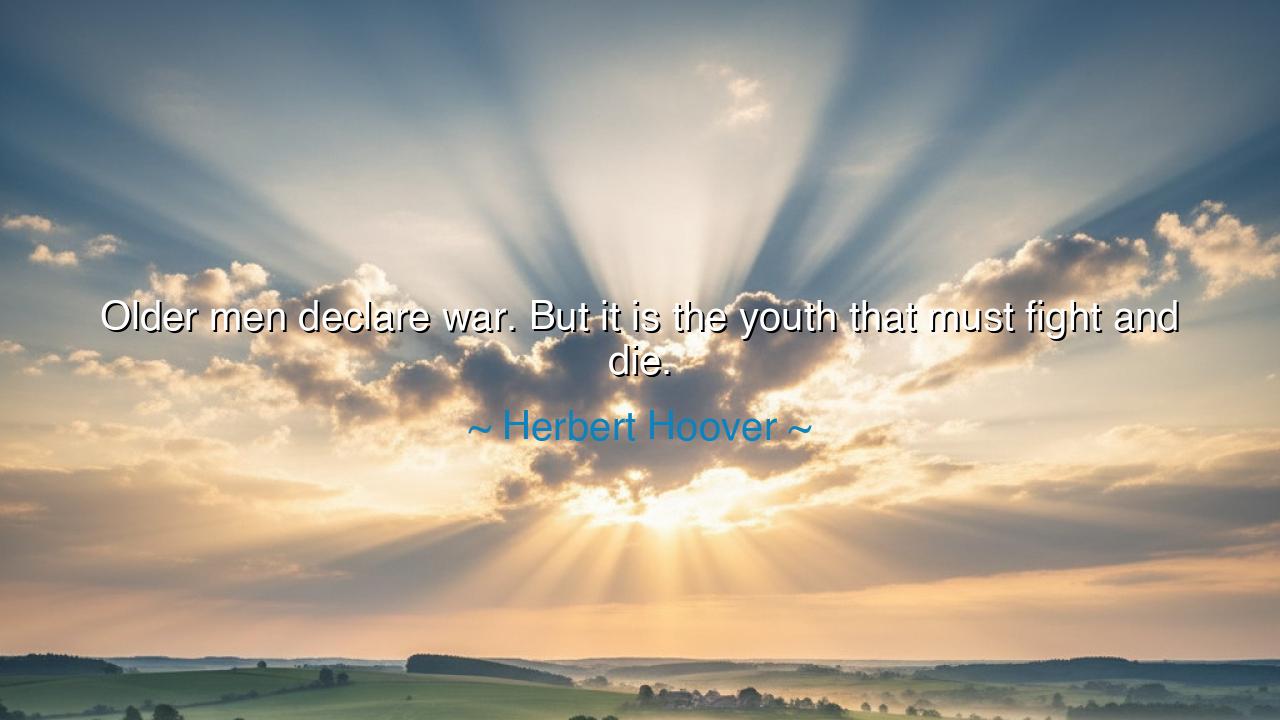
Older men declare war. But it is the youth that must fight and






Hear the solemn words of Herbert Hoover: “Older men declare war. But it is the youth that must fight and die.” In these few lines lies one of the deepest tragedies of the human story, the recurring pattern where those who hold power command, and those who hold strength must sacrifice. Hoover, who lived through the storms of the First World War and into the second, saw clearly this cruel imbalance: that the wisdom of age is too often safe behind walls, while the vitality of the young is spent like coin upon the battlefield.
The older men, leaders, politicians, generals, sit in rooms of safety, writing decrees and shaping policies. With pen and voice they ignite wars, yet they rarely take up the sword themselves. Their role is one of command, not of sacrifice. By contrast, the youth—full of dreams, passions, and the promise of life—become the flesh and blood that bears the cost. This paradox has existed since the dawn of kingdoms: those who least deserve death are the ones most often sent to meet it.
The ancients knew this bitter truth. In Homer’s Iliad, it was not aged Priam or cunning Odysseus who fell in the dust, but radiant Hector, noble Patroclus, and countless unnamed youths cut down in their prime. The elders plotted and commanded; the young paid the price. Even in Rome, senators debated glory while legions of boys marched to the edges of empire, their lives consumed for victories they would never enjoy. Hoover’s lament echoes this timeless injustice.
History provides sharper examples still. In the trenches of World War I, countless young men—farmers, poets, students—were sent to die in mud and gas, while their elders in governments pursued honor and territory. The “Lost Generation” of Europe was not lost by choice; it was sacrificed by decree. The poets Wilfred Owen and Rupert Brooke, both young men of promise, were silenced forever in the war their elders had declared. Their words survive as testimony to the youth who bore burdens not their own.
And yet, Hoover’s words are not only condemnation; they are also a warning. They remind each generation to question the choices of their leaders, to recognize when they are being asked to die for causes not just, not necessary, not truly their own. For while it may be noble to sacrifice life for freedom or for loved ones, it is a tragedy to do so for pride, power, or greed. His words call us to vigilance, to ensure that the fire of youth is not squandered at the whim of age.
The lesson is clear: honor the lives of the young, and weigh with terrible care any decision that would send them to fight and to die. Let the leaders who speak of war remember that it is not their flesh that bleeds, but the flesh of sons and daughters, of futures unborn. And let the youth themselves remember their worth, questioning before they follow, seeking always whether the cause is worthy of the ultimate price.
So let Hoover’s words be carried down as a teaching: that war is never merely strategy or politics, but the sacrifice of human lives—most often, the lives of the young. If we are to build a just and lasting peace, we must learn to listen not only to the older men who declare, but also to the youth who must bear the cost. For in their voices, their hopes, and their futures lies the true measure of whether any war is worth fighting at all.






AAdministratorAdministrator
Welcome, honored guests. Please leave a comment, we will respond soon